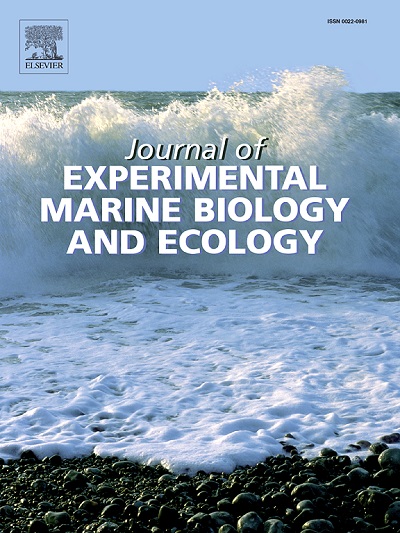Habitat degradation has species-specific effects on the stress response of coral reef fishes
IF 1.8
3区 生物学
Q3 ECOLOGY
Journal of Experimental Marine Biology and Ecology
Pub Date : 2025-01-01
DOI:10.1016/j.jembe.2024.152070
引用次数: 0
Abstract
Coral reefs are one of the world's most threatened ecosystems, with transition from coral- to algal-dominated habitats becoming increasingly common. While habitat degradation in other ecosystems can lead to heightened stress among individuals, thereby increasing energetic demands and reducing fitness, the effects of habitat degradation on stress and metabolic performance of coral reef fish is unknown. Therefore, we investigated whether cortisol levels (an indicator of stress), metabolic performance, behaviour, and growth, were influenced by habitat quality in three fish species with varying degrees of reliance on live coral. We reared newly-settled fishes (Pomacentrus amboinensis, P. moluccensis and Dascyllus aruanus) for three weeks in one of three habitat treatments: live coral, dead coral covered in turf algae and cyanobacteria, or a combination of the two. After three weeks we quantified each individuals metabolic performance, cortisol concentration, morphology, and habitat use. Pomacentrus moluccensis had higher cortisol concentrations in the dead coral treatment, compared to the live coral, whereas there was no difference in cortisol levels among habitat treatments for P. amboinensis or D. aruanus. Overall, metabolic performance (aerobic scope, standard and maximum metabolic rate) showed no consistent response to habitat treatments. Regarding morphology, we only found D. aruanus to be impacted, with individuals from the live coral treatment having a significantly higher mass than individuals from the dead coral treatment. Behavioural space-use analysis revealed that D. aruanus and P. moluccensis spent more time away from their habitats in the dead coral treatments, whereas the space-use of P. amboinensis was unaffected by habitat degradation. Understanding how coral loss affects stress levels and fitness of reef fishes is critical to predict future reef fish communities. This study highlights that vulnerability of reef fish to coral reef degradation is species-specific, and related to their reliance on live coral. These changes may provide a mechanistic explanation to observed population declines following coral loss and indicate that remaining individuals have reduced fitness potentially compromising the subsistence of future populations.
生境退化对珊瑚礁鱼类的应激反应具有物种特异性影响
珊瑚礁是世界上最受威胁的生态系统之一,从珊瑚为主的栖息地向藻类为主的栖息地过渡变得越来越普遍。虽然其他生态系统的栖息地退化会导致个体的压力增加,从而增加能量需求并降低适应性,但栖息地退化对珊瑚礁鱼类的压力和代谢性能的影响尚不清楚。因此,我们研究了三种不同程度依赖活珊瑚的鱼类的栖息地质量是否会影响皮质醇水平(应激指标)、代谢性能、行为和生长。我们饲养新定居的鱼类(Pomacentrus amboinensis, P. moluccensis和Dascyllus aruanus)三周,在三种栖息地处理中的一种:活珊瑚,死珊瑚覆盖草皮藻类和蓝藻,或两者的组合。三周后,我们量化了每个个体的代谢表现、皮质醇浓度、形态和栖息地使用情况。与活珊瑚相比,死珊瑚处理下的moluccensis的皮质醇浓度较高,而P. amboinensis和D. aruanus的皮质醇水平在栖息地处理之间没有差异。总体而言,代谢性能(有氧范围、标准代谢率和最大代谢率)对生境处理没有一致的响应。在形态学方面,我们只发现D. aruanus受到影响,活珊瑚处理的个体质量明显高于死珊瑚处理的个体。行为空间利用分析表明,在死珊瑚处理下,d.a aruanus和p.a molucensis离开栖息地的时间更长,而p.a amboinensis的空间利用不受栖息地退化的影响。了解珊瑚损失如何影响珊瑚礁鱼类的压力水平和健康对于预测未来的珊瑚礁鱼类群落至关重要。这项研究强调了珊瑚鱼对珊瑚礁退化的脆弱性是物种特异性的,并且与它们对活珊瑚的依赖有关。这些变化可能为观察到的珊瑚消失后的种群下降提供了一种机制解释,并表明剩余个体的适应性降低,可能危及未来种群的生存。
本文章由计算机程序翻译,如有差异,请以英文原文为准。
求助全文
约1分钟内获得全文
求助全文
来源期刊
CiteScore
4.30
自引率
0.00%
发文量
98
审稿时长
14 weeks
期刊介绍:
The Journal of Experimental Marine Biology and Ecology provides a forum for experimental ecological research on marine organisms in relation to their environment. Topic areas include studies that focus on biochemistry, physiology, behavior, genetics, and ecological theory. The main emphasis of the Journal lies in hypothesis driven experimental work, both from the laboratory and the field. Natural experiments or descriptive studies that elucidate fundamental ecological processes are welcome. Submissions should have a broad ecological framework beyond the specific study organism or geographic region.
Short communications that highlight emerging issues and exciting discoveries within five printed pages will receive a rapid turnaround. Papers describing important new analytical, computational, experimental and theoretical techniques and methods are encouraged and will be highlighted as Methodological Advances. We welcome proposals for Review Papers synthesizing a specific field within marine ecology. Finally, the journal aims to publish Special Issues at regular intervals synthesizing a particular field of marine science. All printed papers undergo a peer review process before being accepted and will receive a first decision within three months.

 求助内容:
求助内容: 应助结果提醒方式:
应助结果提醒方式:


